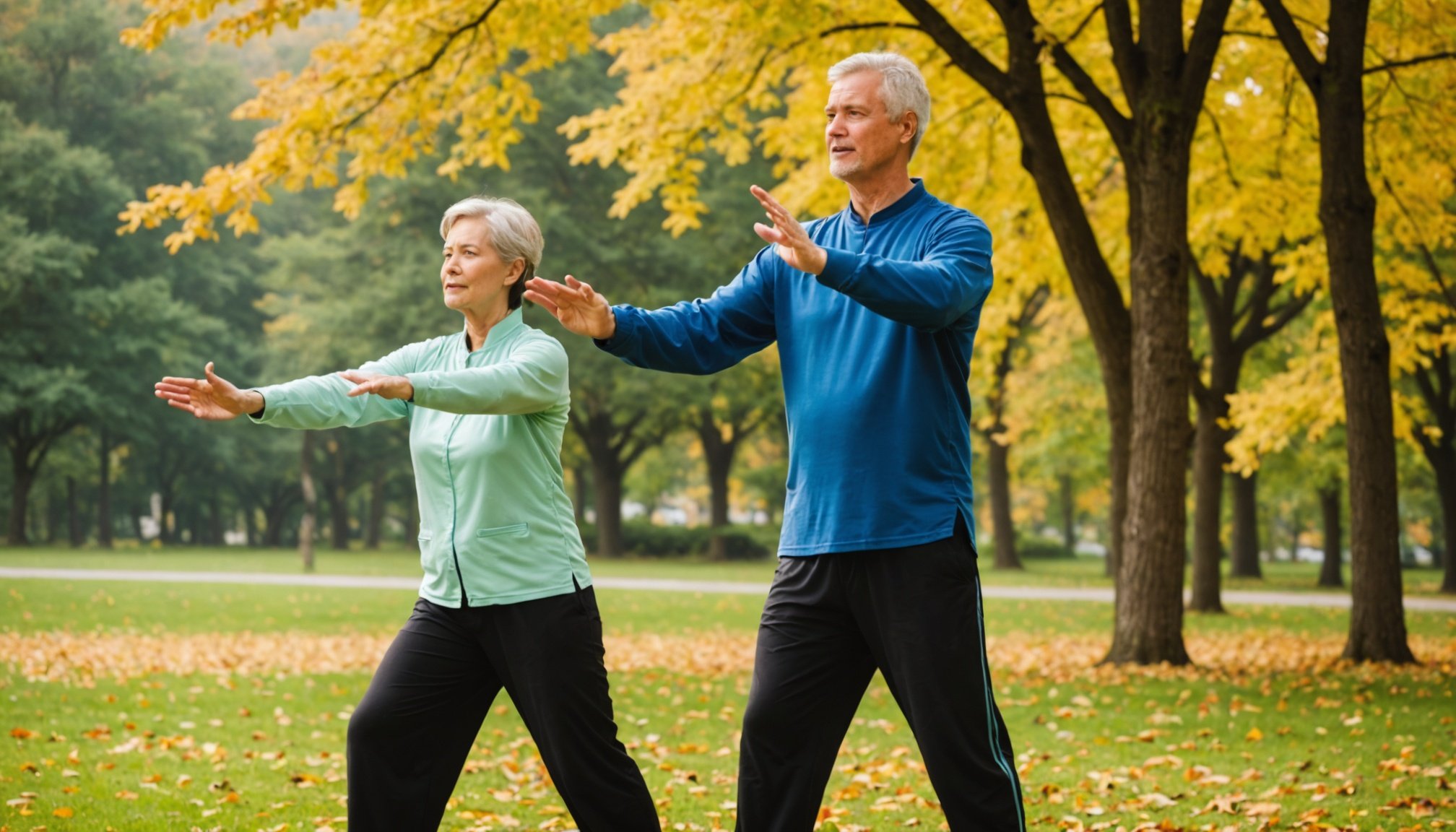Overview of Tai Chi
Tai Chi is an ancient form of martial arts originating from China, characterised by slow, deliberate movements, and mind-body practice. Its roots trace back to the 13th century, when it was developed as both a self-defence technique and a spiritual practice. Over time, Tai Chi has transformed into a popular exercise that focuses on balance, flexibility, and relaxation, engaging the mind to cultivate inner peace and physical health.
Though often classified with other forms of exercise, Tai Chi distinctly combines soft martial arts with meditative practices. Unlike standard workout routines, which may emphasise vigorous physical effort or resistance training, Tai Chi prioritises flow and the synchroneity of breath and movement. This unique style supports practitioners in achieving heightened awareness and tranquillity through mindful movement.
In the same genre : Harnessing Creativity: How Art Therapy Transforms Addiction Recovery
The importance of mindfulness in Tai Chi cannot be overstated. Engaging in this practice involves focusing on the present moment, aligning mental and physical actions to foster a harmonious energy flow, or “qi”. This focus not only improves concentration and relaxation but also supports emotional well-being. By integrating mindfulness, Tai Chi offers a fulfilling experience beyond physical health, nurturing a deeper connection between the mind and body.
Health Benefits of Tai Chi for Middle-Aged Adults
Tai Chi offers numerous health benefits for middle-aged adults, blending gentle movements with powerful effects on both physical and mental well-being. Physically, practitioners experience enhanced flexibility, improved strength, and better balance, all crucial for maintaining quality of life as one ages. These slow, controlled movements help strengthen muscles and improve joint stability, reducing the risk of falls – a common concern in middle age.
Moreover, the mental health benefits are significant, providing a natural method for stress reduction. Regular practice promotes relaxation, lowers anxiety levels, and fosters emotional well-being. Participants often report feeling more relaxed and grounded, with a greater ability to manage life’s stresses.
Tai Chi is also impactful for those managing chronic conditions. Studies underscore its positive influence on conditions like arthritis and hypertension, with potential benefits for overall longevity. By fostering regular physical activity, Tai Chi encourages a holistic approach to health that extends beyond mere exercise.
In summary, Tai Chi uniquely caters to the needs of middle-aged adults, offering a sustainable way to nurture both body and mind, enhancing life’s quality and resilience against age-related challenges.
Evidence-Based Studies Supporting Tai Chi
Numerous research studies have examined the effectiveness of Tai Chi, providing robust evidence for its health benefits. Notably, a substantial body of work highlights its role in enhancing both physical and mental well-being.
Various meta-analyses have consistently shown Tai Chi’s effectiveness in improving mobility and reducing fall risk among older adults. Participants in these studies often report significant improvements in balance and flexibility, underscoring Tai Chi’s importance as a gentle yet effective form of exercise. Moreover, Tai Chi has demonstrated potential benefits for those with chronic conditions such as arthritis and diabetes, providing a holistic approach to managing symptoms.
Findings regarding mental health suggest Tai Chi effectively reduces stress and anxiety. One key study highlighted notable decreases in stress levels among regular practitioners, indicating its relaxing and calming influence. Reports also point to improvements in overall emotional well-being, making Tai Chi a valuable tool for mental health management.
The prominence of these evidence-based practices illustrates Tai Chi’s multifaceted benefits, supporting its credibility and encouraging broader adoption within various populations. For individuals seeking to improve their health in a mindful manner, Tai Chi stands out as an accessible and well-validated option.
Getting Started with Tai Chi
Embarking on a Tai Chi journey requires thoughtful consideration of Tai Chi classes and beginner tips. Start by exploring local wellness centers or community centers that offer Tai Chi sessions. Many individuals find these environments encouraging and supportive, making them an ideal starting point. For those preferring to learn at home, online instructional resources provide detailed guides and videos, accommodating all levels of practitioners.
When beginning, focus on basic forms and movements. These include the Yang style’s “Grasp the Sparrow’s Tail” and “Cloud Hands,” which introduce foundational techniques and ensure a comfortable pace for newcomers. Practice these movements regularly to build confidence and improve your skills gradually.
Integrating Tai Chi into a daily routine enhances its benefits considerably. Set aside a specific time daily, ensuring your practice becomes a consistent part of your life. Mornings or evenings might offer the calm needed for focus and relaxation.
As you develop your practice, seek community groups or forums for additional support. These resources can be invaluable for sharing experiences and obtaining advice, cementing Tai Chi’s role in your healthy lifestyle.
Overcoming Challenges in Tai Chi Practice
Starting a Tai Chi practice can be daunting. Beginners often face challenges such as difficulty mastering Tai Chi movements or maintaining motivation over time. Addressing these issues is essential for embracing the full benefits of this mind-body practice.
Common challenges include mastering the slow, deliberate movements and synchronising breath with flow. Beginners may struggle with maintaining the correct form and posture, which are crucial for effective practice. Overcoming this requires patience and regular practice. Engaging in guided sessions, either online or in-person, can offer invaluable support and technique corrections.
Staying motivated in your Tai Chi journey can also be challenging. Setting achievable goals and tracking progress are effective strategies. For instance, regularly noting posture improvements and reduced stress levels can provide the encouragement needed to continue.
Adaptations are necessary for those with physical limitations. Choose movements reminiscent of seated Tai Chi forms as they offer a more accessible starting point. Consulting a qualified instructor for tailored recommendations ensures practice remains safe and effective.
Lastly, joining community groups offers motivational support and shared experiences, creating a sense of belonging and further enriching the Tai Chi experience. These networks are pivotal for sustained engagement and improvement.
Success Stories from Tai Chi Practitioners
Hearing from practitioners who have embraced Tai Chi and thrived offers powerful motivation. They highlight the transformative power of this ancient mind-body practice. Many share personal testimonials about significant health improvements, citing increased flexibility, better balance, and notable stress reduction. Such accounts demonstrate that Tai Chi is more than an exercise—it’s a holistic journey towards wellness.
Personal experiences vary, but common themes emerge. Practitioners consistently report enhanced mental clarity and a sense of inner peace, proving Tai Chi’s efficacy in promoting emotional and mental well-being. Whether reducing chronic pain or boosting overall vitality, Tai Chi’s gentle yet effective movements have a profound effect.
Community support networks also play a crucial role in sustaining engagement. These groups, whether physical gatherings or online forums, provide encouragement and shared learning, fostering a sense of belonging. In these settings, practitioners exchange tips, celebrate achievements, and support each other in overcoming barriers.
Inspirational success stories abound. From individuals battling health challenges to those simply seeking a more centred life, Tai Chi resonates deeply with diverse audiences. These narratives encourage prospective practitioners to explore Tai Chi’s myriad benefits and discover their own path to improved health and happiness.

